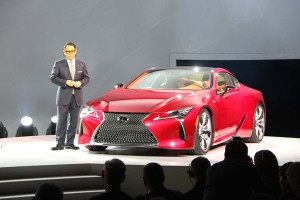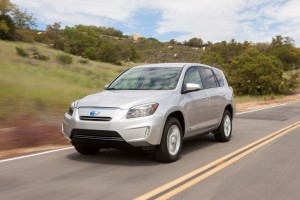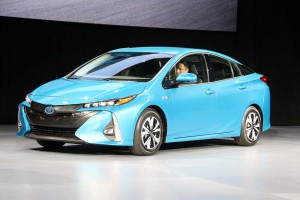
Toyota Pres. Akio Toyoda at the launch of the Lexus LC coupe - which is offered with a hybrid option.
Toyota Motor Co. President Akio Toyoda said Wednesday that he expects half of the company’s sales to come from electrified vehicles – including hybrids and plug-based models – by 2030.
Toyoda spoke during a news conference called to announce a partnership with Panasonic to develop new battery technology that would be used for future Toyota products. The emphasis on electrified vehicles underscores a major shift in strategy by Japan’s largest automaker which, until recently, focused on hybrids but steered clear of more advanced plug-in hybrids and pure battery-electric vehicles, or BEVs.
“The auto industry is now facing a major change of the kind that comes once in a hundred years,” said the 61-year-old grandson of Toyota’s founder.
(Toyota, Mazda, Denso create alliance to develop electric vehicle technology. Click Here for more.)
The new emphasis on battery power is the latest in a series of directional shifts since Toyoda took the reins at Toyota in 2009. He has been putting an emphasis on more “passionate” products, including those with better performance and more striking design, than the company’s traditional, appliance-like models. And while Toyota has long been a leader in the hybrid field, primarily with its Prius model, Toyoda wants to add more advanced, battery-based products, as well.
While Toyoda briefly has sold a few electrified models – most recently a version of the RAV4 crossover developed with the help of Tesla – it has generally shied away from vehicles using lithium-ion batteries in favor of less energy-dense nickel-metal hydride chemistry. That reflects a comfort with the reliability of NiMH batteries, as well as early problems Toyota had with lithium technology.
But the carmaker is watching its image as the cutting-edge leader in green technology largely evaporate as other carmakers stake their fortunes on new zero-emissions models. That includes not only all-electric Tesla but key rivals like General Motors and Volkswagen.
GM now offers both the plug-in Chevrolet Volt and the Chevy Bolt EV, along with numerous conventional hybrids. It plans to have “at least 20” pure BEV models by 2023, according to global product development chief Mark Reuss. Meanwhile, VW has targeted 50 BEVs for its various brands by 2025 and recently announced plans to spend $40 billion on the development of electrified and autonomous vehicles.
(Click Here for a review of the Gen-2 2018 Nissan Leaf.)
Toyota President Toyoda did not lay out specific plans for advanced battery models to come, though it earlier this year announced a partnership with Mazda that will see them share in the development and production of new BEV models at a new assembly plant to be built in the United States. It is expected to begin production in 2021.
To prepare for that launch, Toyota and Mazda have also formed a partnership with Japanese mega-supplier Denso called EV C.A. Spirit Co. Ltd. Toyota will provide 90% of the capital for the venture, which is aimed at development new electric vehicle technology.
The Japanese giant now will enter a separate alliance with Panasonic Corp., a company that is already one of the leaders in electric vehicle batteries. It is the primary partner and the largest funder for the Tesla Gigafactory in Reno, Nevada. And Panasonic already provides the batteries for Toyota’s existing electrified models.
(Toyota set to reveal electrification strategy at 2018 Detroit Auto Show. For the story, Click Here.)
What remains to be seen is what type of batteries the new partnership will produce. Toyota has given strong indication that when the U.S. battery-car project launches the new models to be produced there will rely on next-generation solid-state batteries. These are expected to be lighter, small, more energy dense and quicker to charge than today’s lithium-ion chemistry. And industry analysts believe they eventually will become significantly cheaper.
During the Wednesday news conference, Toyoda said his company expects to sell about 5.5 million electrified vehicles annually by 2030. Pure battery-electric models would account for about 1 million of those – or just under 10% of Toyota’s global volume. Conventional hybrids and plug-ins would account for another 4.5 million sales annually.
By comparison, Japan’s third-largest automaker, Honda, has forecast about two-thirds of its 2030 sales will come from electrified vehicles of various forms.



There will never be an electric vehicle in my driveway! Even current models have far too unnecessary electronic garbage. The excitement of driving just is not there anymore. If the manufacturers want to sell vehicles, give the consumer what they want and stop forcing unwanted garbage on us.
Mike, Many of us felt that way, and some colleagues still do. But when you feel the raw launch power of some new electrics — which can match the Dodge Demon for launch times — it messes with your head and gets you thinking maybe you were wrong about the raw thrill a battery-car can provide. The one failing: the lack of a classic V-8 roar.
Paul E.
I am sure there are exceptions. When I was taught how to drive many years ago, the one thing that stuck with me, you have to become one with car and the road. Electronics, just do not allow that. Sure they try to fake the feeling, but it is not the same. EAS, touch screens, push button start, electric switches for the transmission, none of these are actual improvements. They dumb down the actual driving experience. Like you said, the roar of the V8 is just not there. From personal experience, when the EAS locked up the front wheels of our brand new Highlander causing an accident, That was it for me. We no longer no longer own a vehicle with EAS. We simply do not trust the electronics. We now drive much older vehicles. Even when my kids lived at home, they said they enjoyed the older vehicles better. If you feel the road, you are a much better driver. I am a firm believer many of the accidents today are caused by the electronics. I know mine was.
The data don’t support that, Mike. It happens, no question. I had to disable TCS on the Stinger I was driving (it had, urk, summer compound tires on a 19-degree day with 4+ inches of snow). On the other hand, ESP and TCS helped me on the freeway later. There are some spectacular new machines, the 2018 Mustang GT — especially with Level 2 Pack — doing things I never dreamed possible for a classic pony car. I was surprised at the new 2018 Leaf, as well, albeit certainly no sports car. I think a real paradigm shift COULD come if Porsche delivers with the Mission-E. We will soon see.
Paul E.
Data is viewed from a scientific approach and can be skewed to obtain any result you want. There is a reason accidents and death tolls on highways are rising again, but no one is looking at the true cause; the electronics in the vehicles. The manufacturers do no want to know their products are flawed. Denial, the new corporate culture is to hide flaws and safety issues to satisfy shareholders. That data is crystal clear! You may not agree with me, but as a consumer, it is my hard earned money the manufacturers need to survive and with the direction they are going, they simply will not have it. There are more of us that feel this way than not.
I’d agree that handheld electronics are a factor in rising death tolls. I might even agree that some in-car systems, such as the oversized touchscreen Tesla uses, can create their own distractions. But I disagree that electronics, on the whole, are a negative. I am comfortable with data showing things like Blind Spot Monitoring are having a positive impact and some outside and independent audits by groups often critical of the industry seem to solidly back both of my conjectures up. I agree data can be manipulated…but nothing is more manipulative than rejecting data entirely.
Paul A. Eisenstein
Publisher, TheDetroitBureau.com